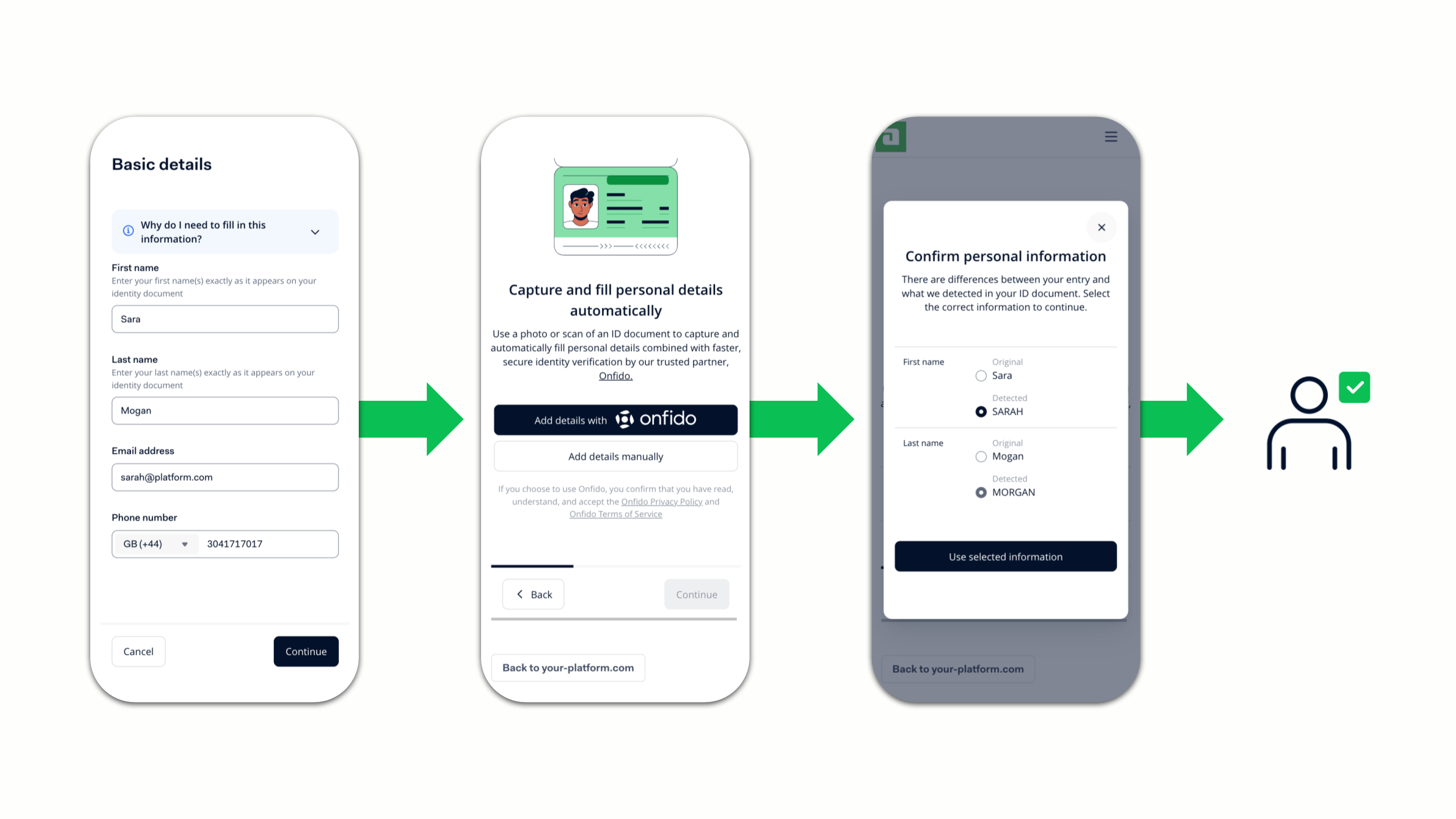Your users' legal entity type and operating country determine the required verification information you need to collect from your users. You can use Adyen's Hosted onboarding or build your own UI to collect information from your users.
- Hosted onboarding: Direct your users to a page hosted by Adyen, where Adyen manages the onboarding flow and user interface (UI). You can either have Adyen create the resources automatically by requesting them in your Customer Area (onboarding on invite), or create the resources yourself by making a few API calls (API-initiated hosted onboarding).
- API-only onboarding: Build your own UI and collect required user data. You make API requests to create resources and submit the user data to Adyen. This onboarding type gives you complete control over the user journey within your platform's environment.
The timing of when you need to collect this information depends on the verification type that applies to your case. After Adyen receives the information, the verification process starts automatically.
Requirements
If you have an Adyen for Platforms integration, there are no additional requirements, limitations, or preparations.
Hosted onboarding
Hosted onboarding Postman flows
Try out Postman flows in your private workspace to test all the required API calls with your own credentials.
Hosted onboarding is our recommended solution for collecting the information needed to onboard your users. This option requires less integration effort, because your users provide their information directly on a page hosted by Adyen.
You can onboard the following legal entity types:
- Organization
- Individual
- Sole proprietorship
- Trusts (Only in Australia and New Zealand)
Adyen offers two different ways to implement hosted onboarding:
- Onboarding on invite: In your Customer Area, request Adyen to create an account holder for your user. You then create a hosted onboarding link to redirect your users to enter their information. Choose one of the following options:
- Create a hosted onboarding link in your Customer Area to share it with your user after their account is created. Your user can securely access the hosted onboarding link with an SMS authentication. They then will be redirected to the Adyen-hosted page to provide their information.
- Integrate the View Verification Status component into your user interface (UI). This component automatically creates a hosted onboarding link, redirects your user to the Adyen-hosted page to provide their information, and shows their verification status.
- API-initiated: Create resources and a hosted onboarding link by making API calls to several endpoints. After you create the link to the onboarding page, redirect your users to enter their information.
Choose the option that best suits your use case.
Supported countries and regions
You can use hosted onboarding in the following locations where your users are operating.
Australia
Austria
Belgium
Bulgaria
Canada
Croatia
Cyprus
Czech Republic
Denmark
Estonia
Finland
France
Germany
Gibraltar
Greece
Guernsey
Hong Kong
Hungary
Ireland
Italy
Latvia
Liechtenstein
Lithuania
Luxembourg
Malta
Netherlands
New Zealand
Norway
Poland
Portugal
Romania
Singapore
Slovakia
Slovenia
Spain
Sweden
Switzerland
United Kingdom (including Isle of Man & Jersey)
United States (including Puerto Rico)
Instant bank account verification in hosted onboarding
For some locations and legal entity types, your users can choose to instantly verify their bank account details in your hosted onboarding page. They are prompted to log in to their online banking environment and confirm their account details. Their bank account is then verified within seconds without them needing to provide a bank statement.
See supported countries/regions
This feature is currently only available for the following locations and legal entity types.
| Country/region | Individuals | Organizations |
|---|---|---|
| Austria |  |
|
| Belgium |  |
|
| Canada |  |
 |
| Denmark |  |
|
| Estonia |  |
|
| Finland |  |
|
| France |  |
 |
| Germany |  |
 |
| Ireland |  |
|
| Italy |  |
|
| Latvia |  |
|
| Lithuania |  |
|
| Netherlands |  |
 |
| Norway |  |
|
| Portugal |  |
 |
| Poland |  |
 |
| Spain |  |
 |
| Sweden |  |
 |
| United Kingdom |  |
 |
| United States |  |
 |
To see an example of the entire hosted onboarding flow, you can watch a video here:
Autofill individual details using ID documents in hosted onboarding
This feature is only available if you are using onboarding v3 or v4
Users filling in their personal details can now scan or upload their ID document in the hosted onboarding page to add this information. This ensures that the information matches the document and improves verification pass rates.
Only ID documents that contain Latin characters are supported.
After scanning or uploading their ID document, the user can confirm their information before submitting it to Adyen.

To test this feature, use the following sample document.
Guided flow to add decision makers for organizations in hosted onboarding
This feature is only available if you are using onboarding v3 or v4
Users can answer a series of questions to ensure that they select the correct role for the decision makers for their organization. Decision makers include ultimate beneficial owners, controlling persons, and signatories.

API-only onboarding
With API-only onboarding, you need to build the UI for your platform where you collect data from your users. You then need to submit the collected data to Adyen by making requests to the Legal Entity Management API and the Configuration API. You can onboard users operating in any of the countries and regions where Adyen for Platforms is supported.
To build your integration more quickly, you also can embed an Onboarding component into your UI to let your users enter their data. These components use the entered data to create the relevant resource. This means you do not need to make an API request to create the resource yourself.